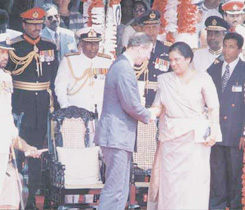
2nd January 2000

![]()
A 'moment' in history
Ranjith Wijewardene, son of press doyen D.R. Wijewardene recalls
 The
few days before the 4th of February 1948 were agonising ones at home. My
father was far from recovered from the stroke he had suffered earlier.
He was however determined to attend the ceremony for the granting of Independence
to be held in the precincts of our present Independence Square.
The
few days before the 4th of February 1948 were agonising ones at home. My
father was far from recovered from the stroke he had suffered earlier.
He was however determined to attend the ceremony for the granting of Independence
to be held in the precincts of our present Independence Square.
My father's friend and physician Frank Gunesekera was equally determined, though with a heavy heart, that he should not go, as he was simply not well enough to do so. Eventually my father accepted his friend's decision with a surprising equanimity and suddenly, I was to accompany the other family members to witness a historic event. It was an impressive ceremony, but a little tedious for a 10-year-old. Our seats were more towards the rear of the Hall and I spent a good part of the proceedings on my feet to get a better view of what was going on.
There was no mention of my father in the speeches that day (as indeed there was not, fifty years thence). But the commentator for Radio Ceylon on that great occasion was Mr. Bobby Weerakoon, formerly a journalist at Lake House, who paid brief but fulsome praise to his "old Boss who had worked tirelessly behind the scenes" to bring about what was being enacted that day. When we returned home, my father clad in his sarong and his face grizzled with a day's beard was seated in the verandah, close enough to the HMV Radiogram (a curious instrument which combined a radio and a gramophone) over which he must have heard Bobby Weerakoon's brief eulogy and which I suspect would have brought him much pleasure.
Somehow I do not recollect any of us offering to relate our impression of the event, nor do I think, he asked. We were all instinctively silent, sensing that he wished to be alone with his thoughts. In a little over two years time, he was dead, old beyond his 64 years.
Family members of his special Editorial team, even today, and perhaps understandably, feel that he paid scant attention to their need for a family life and that he was unconscionably demanding of the services of those who worked closest with him. If indeed that were true, he drove himself no less, nor did we see much of him either. He rarely returned home before 8 p.m. and he was up by 6 in the morning reading through all the newspapers, correcting and annotating ceaselessly.
Only those who live under the pressure of a deadline can understand what an uncompromising taskmaster a newspaper is. When it combines with a cause and that within a time frame, the stress must have been daunting. The demands on him and on his own personal life once so exasperated him that he reportedly exclaimed referring to Lake House, which he had so painstakingly built, "I feel like burning the place".
Today a fashionable "riposte" (because it is usually asked as a question) is "What Independence?" British Rule may well have been comparatively benign from time to time and the Democratic traditions of Westminster did filter through to Britain's colony.
But to those who lived their lives under an all-powerful governor and were in no doubt about being 2nd class citizens in their own land, there was only one answer to the question.
The leaders of Sri Lanka in 1948 had been in the prime of their lives during the martial law period in 1915 and the wounds inflicted during that period ran deep and were not to be forgotten or forgiven easily.
To them and to many others of the time Independence was a real and palpable emotion. Dr. Andreas Nell, E.W. Perera, Sir Mohamed Macan Markar, S. Mahadeva, Sir Oliver Goonetilleke and D.S. Senanayake were frequent visitors at home.
They may have been a part of a westernised elite but they cared passionately about their country and were impatient to nurture its reawakening.
Time, however, moves inexorably. These gentlemen were already advanced in years as a new era was ushered in. It was left to the generations that followed to be profligate with the gift bestowed them.
More..
![]()
Please send your comments and suggestions on this web site to
 D.S.Senanayake's
personality had all the qualities of an elephant's trunk; it was strong
enough to wrench an offending tree from its roots while it was sensitive
enough to feel for and pluck a tiny blade of grass. By a series of triumphal
marches all over the country with pandals spanning the roadways, he rode
his way into public acclamation on the barebacks of elephants to be seen
by multitudes.
D.S.Senanayake's
personality had all the qualities of an elephant's trunk; it was strong
enough to wrench an offending tree from its roots while it was sensitive
enough to feel for and pluck a tiny blade of grass. By a series of triumphal
marches all over the country with pandals spanning the roadways, he rode
his way into public acclamation on the barebacks of elephants to be seen
by multitudes.